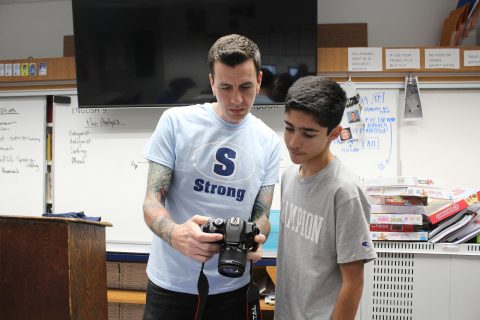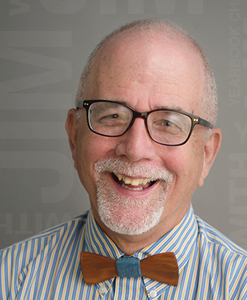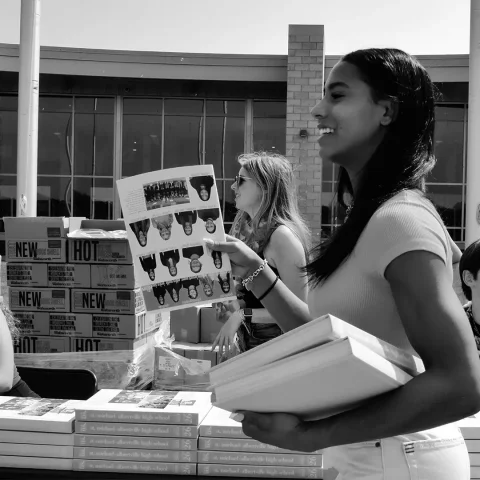Darren Thomas has been teaching for years, but never advised a yearbook until the 2019 school year. As a new teacher at Saugus High School in Santa Clarita, California, he was looking for a way to feel more connected to his new school. He leaned on his editors that first year, and the staff created an award-winning book.
In his second year, Thomas and his staff have the difficult task of covering a school year that includes a tragic event – a school shooting Nov. 14, 2019 left two students dead. Thomas addresses those events below and in his interview for the Yearbook Chat with Jim podcast. Listen at walsworthyearbooks.com/podcasts or wherever you get your podcasts.
Profile
Darren Thomas
Saugus High School, Santa Clarita, California
High School Attended: Thornton High School, Thornton, Colorado
College Attended: Metropolitan State University of Denver (BA) and University of Colorado at Denver (MA)
Did you participate in journalism in high school? No
Did you participate in journalism in college? Yes, I majored in journalism my freshman year and I hosted a radio show on our campus radio. My show was mainly a music program; it was a funk, punk and ska hour. The radio booth was really old-school though, and I had to use the huge switchboard to transition from music to a live microphone to patching in calls on the air for requests. There was a template we had to follow for all of our shows where we had to read the campus news at a certain time on the hour, play commercials that were pre-loaded on these old 8-track cartridges, and we even had to read the weather forecast from the internet. I had a fear of public speaking growing up, but having a radio program helped me get over that fear because I didn’t have to see my audience. It gave me a lot of confidence in making the decision to become a teacher just a couple of years later.
Share some of your best experiences as a journalist in college. My favorite memory from my radio program was when I finally started broadcasting the station phone number and asking people to call in with requests. This wasn’t something we were taught to do, but I was curious if people would call and what they would want to hear. I had no idea how many people listened to my show, so I was a little nervous that nobody would even call. Some of my friends on campus started calling and requesting songs, but then I got a call one day from some high school kids in the area and they told me that they listened to every show. They told me they were grateful that someone was playing music that didn’t usually get played on the radio and introducing them to new music. It was a really cool experience, and it was my first experience realizing how far-reaching my efforts can travel without me even realizing.
What were you doing before you became a teacher and a yearbook adviser? After my first two years of college, I actually took a few years off to work full time and figure out what I wanted to do with my life. I managed a Hot Topic at the mall, and I moved around for a few years managing different stores in Pennsylvania and Colorado. My background in being a retail manager was very helpful when I became a yearbook adviser. I was really good at making schedules, hiring, tracking sales figures, and staying organized with spreadsheets. Yearbook is a lot more like running a small business than my English classes, so I like to think of my program as my own little Hot Topic, but with less punk rock and more One Direction, because I hear my editors playing their own music most of the time.
Size of your book: 9
Number of pages in your book in 2019: 388
Number of pages in your book in 2020: 392
Student population: 2550
Number of yearbooks sold in 2019: 1800
Awards for the 2019 book: CSPA Crown finalist, ASPA Most Outstanding High School Yearbook for 2019
Number of books you have advised at Saugus, including the 2020? 2
Other schools you have taught and at: Horizon High School, Brighton, Colorado; Ralston Valley High School, Arvada, Colorado; and Prospect Ridge Academy, Erie, Colorado
Other classes you teach at Saugus: American Literature, English 9
Q&A
How and why did you first get involved with scholastic journalism?
I moved to California three years ago and didn’t really know anyone here. I honestly struggled a little bit my first year. I didn’t know the students, my colleagues or the community. The students tested me a lot, and I lost a lot of confidence after having taught for 12 years back in Colorado. The last school that I taught in before Saugus was a small school and I was involved in almost everything there. I designed the 10th grade English curriculum, I coached boys and girls soccer, I planned and even emceed assemblies, I organized and ran the first powder puff football games, I had a creative writing club, and I even served on the hiring committee. Suddenly, I was just one of 19 teachers in an English department where I knew no one. I knew I needed to find ways to get involved and invested in the school community, so I volunteered to start coaching soccer. At the end of my first year, someone told me the yearbook adviser was stepping down and suggested I apply. I actually laughed at first. There’s a stereotype about yearbook being a massive and thankless undertaking that means you basically live at the school.
But then a few weeks went by and I heard people still asking others if they wanted to do yearbook. When I thought about it, I realized it was a perfect opportunity for me. I had originally majored in journalism and minored in photography. I love writing and creative projects. I needed something to help me feel connected and invested in my new school. The next day, I went to my principal and told him that I wanted the Yearbook class. It’s one of the best decisions I’ve made as an educator.
How and why did you decide to go into teaching? advising?
I grew up in a family full of teachers and actually was averse to the idea of teaching when I was younger. It wasn’t until I was taking time off from college that I really found my love for literature, and I changed my major to literature when I went back to college. I still wasn’t sure what I wanted to do with my literature degree, but I added the teaching endorsement as my minor to give myself options. I started working at a bookstore when I was paying my way through college, and I remember being so sad when I worked at the cash register. I loved classic novels, philosophy, drama, social sciences, and I thought I would spend my days discussing and selling those things. The vast majority of people just bought magazines and coffee before going next door to see a movie and I came to really cherish the moments when someone came through the store and asked for actual reading recommendations or wanted to discuss classic literature.
So few people really seemed to read or care about reading, and I wanted to lead other people to the same love of literature that I found and that was so influential in my life. Being able to teach literature to teenagers and passing on my enthusiasm for Shakespeare, Vonnegut, Steinbeck, Orwell and Salinger is very rewarding. Advising yearbook gives me a similar experience, but it is rewarding because I’m giving students a huge advantage in their endeavors after high school. They are basically working part-time jobs and learning very attractive skills in today’s job market, both in using technology and in time management, meeting deadlines, working as part of a team, and managing others.
What was the most difficult part of your first year advising?
I’m the type of person that likes to feel in control and have everything planned out. I had absolutely no idea how to make a yearbook, how to use any of the software, or how to teach the class. I really had no idea what I was getting myself into or what I was doing. It was scary to throw myself into that situation and just have to trust this group of students I’d never met before. However, I inherited a well-trained staff who seemed to know how to do everything. I used a lot of my organizational skills to guide the process and my experience and knack for design and photography to give them advice, but I had to trust my editors.
It was difficult to see the big picture or how it would all come together. It was sometimes frustrating not knowing what came next or how to solve a problem. It was humbling, but I learned that one of the best things I could do from the very beginning was admit that I had a lot to learn. I was eager to learn it, but I admitted when I didn’t know something and asked for help. There were a lot of times that I told my staff, “I don’t know the answer” or “I don’t know how to do this, so either teach me or let’s figure it out together.”
I know you took over for a well-loved, award-winning adviser. What did you do to help make the transition so smooth?
There were definitely pros and cons to taking over for a veteran teacher that ran an award-winning program. I inherited an amazing staff and Christina [Tolisano] generously handed me all of her material and calendars from previous years. I told the staff from the first day that I was going to honor the system and training they had by not changing those things my first year. I knew that I needed to learn how a yearbook is made before I could have the expertise to start changing how things were done. I felt a lot of pressure to make a great book, but I decided to let my editors-in-chief create a vision for the book and trust them to execute that vision. I would support them, organize them and guide them, but I finished the year feeling like they had taught me way more than I had taught them about how to make a yearbook.
What made you want to come back for year two?
There were so many things I loved about making my first book, but there were two things that motivated me the most. The first was distribution day. I was so focused all year with getting the book done on time that I was not prepared for how emotional and special it would be on the day when we finally got to gather as a whole staff, do a finger drum roll, and open that first box of books together. Seeing it all come together was overwhelming, but it was even more special to see the student body unwrap and look through our book for the first time. I took several moments on distribution day to just walk away from the lines and walk around the quad to take in the sight of hundreds of students sitting and looking through the book, pointing, smiling, laughing, and writing notes to one another. It was a unique experience to see an audience enjoying what we spent all year creating. The second thing that made me want to return was when I sat down with our book and looked at all of it with pride, but also saw all of the things that I wanted to do better. Now that I know how to make a book, I was filled with ideas about how to elevate our book next year and I was so excited to go to summer camp and start working on our new theme and cover.
What advice would you give to a first-year adviser?
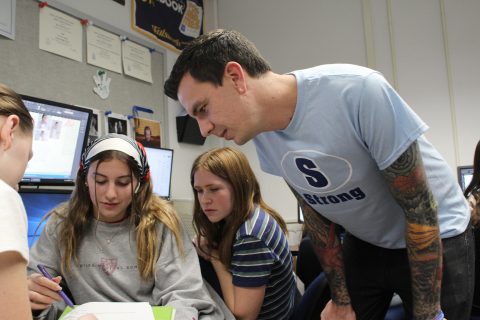
There are so many things I could share, but these are a few things that I think any adviser in any situation could benefit from hearing. First, be kind and make friends with all of your classified staff. Secretaries, janitors, the registrar, the IT person, facilities managers, and school accountants are all going to be your best friends or should be. Yearbook advisers have so many needs and have to call in so many favors, whether you need software installed, a purchase order approved, a list of student schedules or a desk chair repaired. Getting to know these people and building good relationships with them was a huge advantage. Second, set clear boundaries about who is making decisions about different facets of the book. I decided early on to really let my students take control of the creative vision and design of the book. I want them to be invested and know that this book is really their book. The photography, design, and content was all done exclusively by my students. I was happy to lend my editing skills occasionally, but I tried to limit my role more to teaching them how to lead, how to resolve conflict, how to effectively communicate, and how to motivate others and get results from their staff. I had my editors do all of the teaching when it came to how to use the software and make the book. I found that I spent the majority of my time mentoring my editors to get the results they wanted.
The last thing I would recommend is to be vulnerable and authentic with the students. The relationships that I have with my yearbook students are some of the most special relationships I’ve had with any students in my career. I always make an effort to be honest and transparent with them in my decision making, my struggles, and what I do and don’t know. There are times when I have to be hard on them to meet a deadline, but I always make sure to heap them with praise when they deserve it and to let them know how amazing they are at their jobs. I don’t ever want a student to do something begrudgingly or out of fear of consequences. I want them to do something because they take pride in their book and they want to make me proud.
Your staff received a CSPA Crown nomination for your first book. What were some of the factors that led to such quick success for you?
I have to give a lot of credit to my predecessor Christina and my editors-in-chief last year, Kayla and Alexandra. Christina gave me a very successful program, and I have said many times that my two editors-in-chief last year were the best training wheels I could have asked for. I spent so many afternoons just watching over their shoulders as they worked in InDesign and was in awe at their proficiency and creativity. By the end of the year, even freshmen who were new to the class were running circles around me in their knowledge and proficiency with all of our equipment. I feel like my biggest contribution to the success of the book was my organization. I love spreadsheets. I spent a lot of work afternoons designing Excel spreadsheets to organize the production of senior tributes, manage page submissions, schedule group photography, and keep my to-do lists. I shared all of these organizational tools with my students and taught them how to use them. We never missed a single deadline. I kept telling everyone that I was just waiting to feel totally overwhelmed, but that moment never really came. We always stayed one step ahead of everything that needed to get done.
What has been your biggest challenge as an adviser?
Before taking over last year, I had never used Photoshop or InDesign. It was difficult and uncomfortable, especially this far into my career, to step into a role where I had such huge deficits of knowledge. I haven’t always been the best at asking for help in the past. That changed quickly last year. Almost daily, we had moments in class where I had to say, “I have no idea, but let’s figure this out together” or “Let me call someone and ask.” Back when I managed stores at the mall, a supervisor once marked me down on an evaluation and wrote that I did not delegate tasks well and that she had heard me say “If you want something done right, do it yourself.” It’s true; I used to say that all the time. That doesn’t work with yearbook. It’s a job for 20 or more people at my school. Now, my mantra is “I can do a great job, but I can do an even better job if I ask for help.”
November 14
Where were you during the events of Nov. 14?
I teach American Literature first period, so I was in my classroom with my 11th grade students. They were doing a practice test on computers in preparation for a final exam the next day. As a result, it was very quiet in my room when we heard the gunshots just outside. The school where I taught in Colorado did some very intense shooter simulation training with teachers, so I knew and recognized the sound for what it was immediately. Within seconds, I had my students in lockdown and we waited in the dark for nearly an hour before the SWAT team finally evacuated us from my room.
What was the immediate response by you, your school, your yearbook editors and staff?
We were all in shock for a day or two. It sounds strange to say, but I don’t remember feeling much of anything at all while it was happening and the whole rest of the day. It was like all of my emotions shut off and I was just acting on instinct. I got my students on the floor in the corner of the room, and I stood next to the window to give them updates on what I saw. I didn’t feel fear or anger or sadness. That all came later. I just kept thinking about what I was taught so many times to do when this happened. The next day and the next week was when all of the sadness overwhelmed me. The next Monday, I went back to campus and met with my editors-in-chief and my representatives to discuss what this meant for the book. It was the first time any of us had been back to the campus, but I was glad I was able to be there with them for that first step, and it became immediately apparent that the yearbook was no longer just a yearbook. It was a therapeutic outlet for us, it was a potential tool to help our students and community heal, and it now had a higher purpose for us than just trying to please judges and win awards.
We understand the responsibility that we now have, but we welcome the opportunity to feel helpful. That was one of the worst things about what happened. I spent that whole weekend feeling so helpless. I kept asking myself what I could have done differently or better on that day, but I also watched as the entire community started this amazing outpouring of donations, support, and kindness. I wanted to help, too, but there were days I could barely get out of bed or even stay awake. I was so exhausted all of the time for weeks afterwards. I keep telling myself that I already have great responsibilities right in front of me and that the best thing I can do is to take care of my students and for us to make a yearbook to the best of our ability. I think we all feel that calling now in our yearbook staff.
What has occurred since you returned to school on Monday , Dec. 2?
Unfortunately, we see events like those of Nov. 14 with increasing frequency. A school shooting should be shocking. It should spawn immediate outrage across the country. However, shootings have become so commonplace that we see another school flash through the headlines for a few days and then everyone forgets about it. What you don’t see is that the students, staff and community surrounding that school are traumatized and struggling to regain any kind of normalcy again for weeks, months, even years. We were closed for over two weeks before many students even stepped foot on campus again, and even now we can’t just go back to teaching English, history, math, and science. We have to spend hours and hours training on how to teach grieving students. We have to have countless meetings about how to handle curriculum, grading, final exams and homework. We have to offer systems of support for staff and students who are struggling to teach, learn, and get through a normal day at school. We will wear the scars of this event for the rest of our lives, but I also strangely feel better being with my students and colleagues then I do with anyone else. People can offer their sympathy and listen to what we went through, but I know no one else really understands what it’s like to try and recover from something like this happening.
How does your staff plan to cover the events of Nov. 14 and what has followed?
It did not take long at all for my editors and I to decide that we would not include photos or report on what actually happened on Nov.14. Sadly, anyone can search “Saugus High School” on the internet now or in the future and be flooded with articles about that day. We obviously want to honor the victims, and we will have memorial pages for those students that lost their lives. But, we also decided to move forward and make the book that we already planned to make and were already making. We’re not changing our theme, our cover, or anything that we had already completed. We want to document the response of the community and the strength and resolve of our students. We will showcase our victories, our struggles, and our journey in the aftermath of what happened, but in May we want to present our students with a book that they will want to revisit over and over and that still celebrates all of what makes us such a great community.
How is everyone holding up?
I’ll be honest. It’s difficult. One of the hardest parts is that I look around and a lot of people look like they’re totally fine and back to normal, but then I read a student’s story or I talk to a colleague at lunch and I am heartbroken by the sadness and fear that is still impacting so many of us. As a teacher, I’ve always had to put on a happy face and teach no matter what is happening in my personal life, but this has definitely been a reminder of how much of what we feel and struggle with in life lies beneath the surface of what people typically see.
What advice would you give to a school, an adviser, a staff who is facing any horrific on-campus tragedy?
I would emphasize again how differently everyone process traumatic events, and that just because someone appears to be okay does not mean that he or she is unaffected by what happened. The best thing you can do is to be authentic with your students through difficult times. Open up to them, be honest and vulnerable with them, and be sensitive to the fact that you cannot just expect to return to business as usual without allowing them to properly grieve and process the event. Teachers spend a lot of time talking about differentiation even under normal circumstances, but what I have experienced in my classes in the last couple of weeks has been differentiation to the extreme. There are students who want normal academic work and there are students who struggle to even physically be here. I literally have students doing everything from analyzing short stories to journaling to working in coloring books.
Life as an Adviser
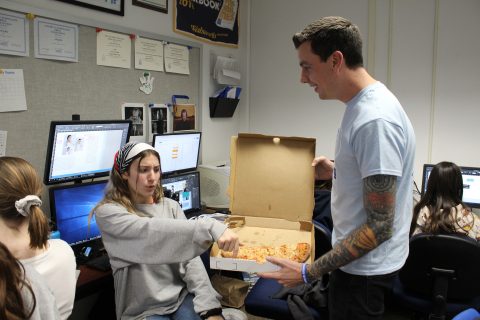
Tell me about something in your life as an adviser that has made you proud.
I submitted our 2019 book for critique with NSPA, CSPA, and ASPA, mainly because Christina has always submitted to those organizations and I wanted the feedback from the judges to make the book better. I thought it would be a nice way to get a baseline for what we did well and how we can improve in coming years. I really wasn’t expecting to win anything. When the students came running into the room on Nov. 1 saying we’d won an award, I thought they were messing with me. Then they showed me the CSPA Twitter account, I saw that it was a Crown award, and I was floored. I am so incredibly proud of all of my students. Knowing that they made a Crown-winning book in the same year that they taught me how to make a yearbook is a mind-blowing achievement.
Tell a story that is indicative of your life as an adviser.
Last year, I was so excited about having our first official work afternoon after we assigned pages and started building the book. I ordered a ton of pizza, I was excitedly running between labs looking at all of the students selecting photos, writing copy, and teaching each other how to use various features of InDesign. Then, out of nowhere, I started having the most intense abdominal pain I’ve ever had in my life. I actually thought an organ had ruptured. I ended up having to send everyone home and rushing myself to urgent care where I promptly collapsed on the floor in a sweaty heap. It turned out I just had my first kidney stone. I’ve since learned that absolutely anything can and will happen in the middle of deadlines, and you have to be flexible when trying to meet deadlines, because almost nothing will go quite as planned. I give my students deadlines that are really aggressive so that I’m pleasantly surprised and we’re ahead if we meet them, but I can extend them without issue when needed.
Tell a story about a moment in your career as adviser that you will never forget.
I would go back again to that memory of my first distribution as an adviser. Yearbook is such a large undertaking and seeing all of our months and months of hard work finally come together into a physical book we could hold and flip through was powerful. It’s a moment most students at our school look forward to, but no one appreciates just how much goes into making that book like the yearbook staff.

